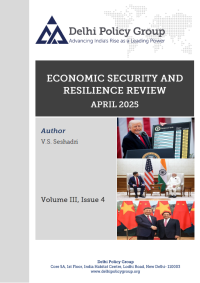Economic Security and Resilience Review
Date: May 11, 2025
The main focus of this month’s review is US President Donald Trump’s announcement of ‘reciprocal tariffs’ on April 2, 2025, that could have a disruptive impact on both world trade and the world trading order. While the full imposition of these reciprocal tariffs remains paused for 90 days, a baseline tariff of 10% is in effect for all countries , along with the 25% tariffs already imposed on steel, aluminium, autos and auto products. The resulting uncertainty over the US tariff regime has led both the IMF and the WTO to significantly lower forecasts for the growth of the global economy and global trade for 2025.
In his policy brief Volume X, Issue 13 of April 14, the author had examined how the newly imposed tariffs and those temporarily paused may affect India, as well as the need to progress a Bilateral Trade Agreement that is under negotiation with the US.
This issue covers further developments related to the India-US BTA, and how major trading economies in Asia and the EU are responding to the US tariffs and moving forward with remedial negotiations. It also examines the firm stance taken by China, which has retaliated to the US tariff measures and has faced counter-retaliatory actions from the US, ending up with a 145% tariff for Chinese exports to the US and a 125% tariff for US exports to China.
The author draws attention to China’s summit level outreach to countries in Southeast Asia and Europe, urging them to resist US trade unilateralism and uphold the multilateral trading system which has propelled China’s economic rise.
Implications of initiatives announced by President Trump relating to deep sea mining and levying of a shipping tax are highlighted, as well as the US-Ukraine agreement on critical minerals.
Finally, this issue briefly covers the successful conclusion of India’s FTA negotiations with the UK.
To read this issue of the ESRR, Vol. III, Issue 4, please see the PDF attached
In his policy brief Volume X, Issue 13 of April 14, the author had examined how the newly imposed tariffs and those temporarily paused may affect India, as well as the need to progress a Bilateral Trade Agreement that is under negotiation with the US.
This issue covers further developments related to the India-US BTA, and how major trading economies in Asia and the EU are responding to the US tariffs and moving forward with remedial negotiations. It also examines the firm stance taken by China, which has retaliated to the US tariff measures and has faced counter-retaliatory actions from the US, ending up with a 145% tariff for Chinese exports to the US and a 125% tariff for US exports to China.
The author draws attention to China’s summit level outreach to countries in Southeast Asia and Europe, urging them to resist US trade unilateralism and uphold the multilateral trading system which has propelled China’s economic rise.
Implications of initiatives announced by President Trump relating to deep sea mining and levying of a shipping tax are highlighted, as well as the US-Ukraine agreement on critical minerals.
Finally, this issue briefly covers the successful conclusion of India’s FTA negotiations with the UK.
To read this issue of the ESRR, Vol. III, Issue 4, please see the PDF attached



